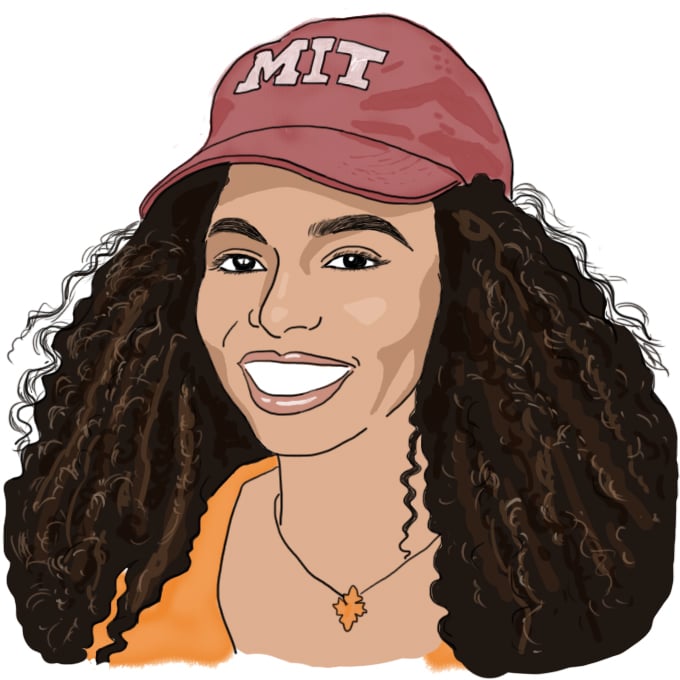
MIT and Black Greek Letter Organizations by Kidist A. '22
An Interview
A few weeks ago, I called three friends, AudreyRose ‘21, Nikayah ‘19, and Kenneth ‘19, to talk about their experiences as members of historically Black Greek letter organizations. My goal is to illustrate that there is a D9 presence at MIT and show the many benefits of joining one.
Learning About D9s
D9 is a shorthand for “Divine Nine”, a casual label that refers to nine historically African American Greek-lettered fraternities and sororities. Officially, the nine organizations constitute the National Pan-Hellenic Council. The first Black intercollegiate Greek fraternity is Alpha Phi Alpha, founded in 1906 at Cornell University. In the next sixty years, eight other organizations would form at different universities, namely Alpha Kappa Alpha Sorority (AKA), Kappa Alpha Psi Fraternity (KAΨ), Delta Sigma Theta Sorority (ΔΣΘ), Omega Psi Phi Fraternity Inc. (ΩΨΦ), Phi Beta Sigma Fraternity (ΦΒΣ), Zeta Phi Beta Sorority (ZΦB), Sigma Gamma Rho Sorority (ΣΓΡ), and Iota Phi Theta Fraternity (ΙΦΘ). Each organization has a rich and unique history, culture, and traditions, and its members can span several generations.
Kenneth is one member like that. He has grandmas, grandpas, aunts, uncles, cousins, and parents who are part of a D9 organization. He grew up surrounded by paraphernalia 01 Black Greek apparel and other Black Greek decorations. He recalls noticing that his dad would have an immediate connection with people he had just met after a brief conversation. As Kenneth grew older, he understood where this instant camaraderie came from–a shared fraternity. On the other hand, Nikayah had not heard about D9 organizations until she came to college. It was actually Kenneth who told her about them after she expressed her desire to join a sorority but was hesitant to join MIT sororities since most are majority white and Asian. In the middle is AudreyRose, who didn’t come from a Greek-affiliated family but knew people at her church who were. She started to learn more about D9s in middle school when she began to think about college, specifically HBCUs. On top of her own research, her pastor and bishop shared their experiences with their fraternities and connected her with other Greek-affiliated individuals.
During her senior year of high school, AudreyRose, who lives in Massachusetts, would leave her hometown and explore the Boston area, especially because she was considering attending MIT. Having a strong Black community was one of her deciding factors, and she was unsure whether MIT would have that compared to the other HBCUs and universities she was considering. In addition, she didn’t think D9 organizations would be available at MIT and was starting to accept that joining one wouldn’t be a reality for her at least during her undergraduate career. But, when she attended CPW, she not only saw the Black community at MIT but also noticed a few people wearing their paraphernalia, which assured her decision to commit to MIT.
Since Kenneth grew up surrounded by Black Greek culture, he just assumed D9 organizations would be at any university he went to. However, during rush week,02 Rush is 'a chance for new freshmen guys to get a chance to meet as many fraternity members as possible and decide whether or not they’d like to live in a fraternity. It’s also a wonderful excuse to go paintballing, F1 racing, eat the obligatory steak and lobster, and throw golf balls attached to some string at a horizontal piece of PVC' This was taken straight from Snively's post titled The Other Side of Fraternities because I would not have described it any better. Kenneth went to most of MIT’s fraternities and asked people if they’d heard of different D9 organizations and was confused when hardly anyone knew about it. He says there was one person from everyone he spoke to who knew specifically of D9 organizations. While this was saddening, it provided a great opportunity to witness these organizations’ connections spanning across state lines. His dad, a member of Kappa Alpha Psi Fraternity, contacted alumni members in Boston and found that there was a chapter in the area. Additionally, when visiting MIT, his parents attended an OME event and met faculty affiliated with D9 organizations. One of those faculty was a Kappa and connected with Kenneth’s dad and later Kenneth himself. This connection helped Kenneth when he was trying to understand what the Greek scene was like in Boston.
After Kenneth told Nikayah about D9 organizations, she took it upon herself to do more research. She knew there was an AKA on campus, so she reached out to her asking for her perspective. Nikayah learned that MIT used to have a history of having a lot of Greek on campus, but in recent years it has gotten smaller. She also gained some insight on how these organizations work in Boston. Nikayah also spoke to faculty such as Dean DiOnetta Crayton, Director of the Office of Minority Education, who outlined the advantages from a professional standpoint. She also went to events and talked to other members.
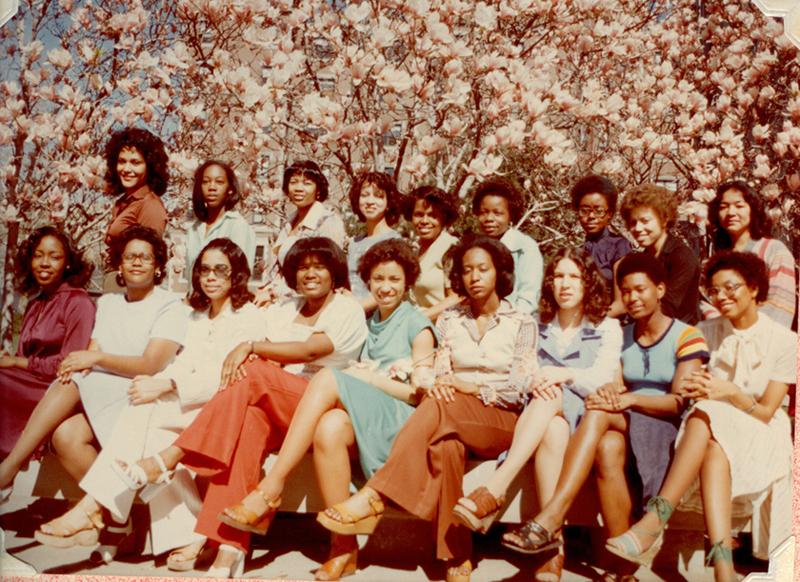
Chartered on October 8, 1977, the Lambda Upsilon Chapter of AKA was the first sorority on MIT’s campus of any type. Lambda Upsilon’s membership consists of students from MIT, Harvard University, and Wellesley College.
One of these events was a probate03 A probate is a new member presentation and is oftentimes a show of the organization's history, mission, steps, strolls, and more. on the weekend of AudreyRose’s CPW. Attending this probate provided Nikayah with a chance to connect with members of Delta Sigma Theta. While Nikayah would go on to later join this sorority, at the time, the Cambridge chapter had become inactive, and the people she had met had graduated from this chapter. Still, this was where the dialogue started for her. For AudreyRose, this event provided her with the additional reassurance that taking part in Black Greek life was a possibility.
Values and Decisions
All three of them had at some point considered joining one of the MIT-affiliated sororities and fraternities. AudreyRose says that she didn’t consider them as heavily as she could have. Several people she’d met during Interphase or CPW were considering going through recruitment, so she’d thought about joining them. But learning about the recruitment differences between IFC and Panhel04 IFC stands for Interfraternity Council and Panhel is the sorority version of IFC dissuaded her. From the information she was given prior to signing up for recruitment, she found that the recruitment events for sororities began early in the morning and lasted most of the day for several days as people had conversations with current sisters to try and understand the culture. While she believes this is incredibly valuable, AudreyRose wanted to take part in the more fun events fraternities were hosting for recruits such as eating steak and lobster, going jet-skiing, or taking them to the beach, trampoline parks, etc. She felt that not only was the timing inconvenient but also the sororities weren’t engaging with her in the way she would have wanted to. Nikayah’s story mirrors AudreyRose’s, and they ultimately both didn’t go through with recruitment (consider reading these two blog posts about MIT Panhel and fitting in for other perspectives).
As mentioned earlier, Kenneth had always thought he’d be able to join a D9 organization in college. However, when he asked around and only one person barely knew about it, he didn’t believe that joining a D9 organization would be a possibility. So he fully participated in rush activities and even got six bids. 05 </span>Bids are invitations to join a fraternity. Later Kenneth saw an opportunity when his father told him that there was actually a city-wide Boston chapter and an event happening at BU. In the end, he turned down all his bids and returned to his original intention.
The three all focused on finding an organization that aligned with their values in their search for the D9 organization they wanted to join. Nikayah learned early on in her research that these organizations would be a part of her life beyond her years at college, so she looked for organizations that matched her personality and goals. Each of the D9 organizations has different national initiatives, and the one she related to most was Delta’s. Nikayah has always wanted to serve underrepresented children, especially in ways to make STEM and college more accessible. Delta has three programs related to educational development that are common amongst many collegiate and alumni chapters,06 Chapters for people who have graduated from college but want to remain active in the organization which really stuck out to Nikayah.
Kenneth’s decision came down to the objectives and fundamental purpose of the organizations. Though he does admit his father’s and grandfather’s association with Kappa played a factor, he did his own research and found that Kappa’s mission resonated with him the most. Kenneth explains that above all else Kappa treasures achievement in every field of human endeavor. He liked that this was expressed explicitly as their fundamental purpose and objective, and the different services and initiatives to achieve this goal stood out to him compared to other organizations.
AudreyRose wanted to align herself with an organization and people that fit her passions and values. AudreyRose has always been interested in education and political action, serving in her youth group at church and as the Political Action Chair for the BSU this past year. So, Delta’s initiative on political awareness and involvement as well as educational development addressed her interests. AudreyRose is also an incredibly talented and creative writer (buy her chapbook on More Than Ghetto, a platform she founded to provide young creatives of color a place to share and publish their first works). Many Delta chapters have an Arts and Letters committee whose goal is to promote awareness, encourage development, and showcase various fields of artistic endeavors. For these reasons, joining Delta was the right decision for her.
A strong support system was important for all three of them in their decision to join a D9 organization. Kenneth was looking for something similar to what his dad experienced after his dad’s college years. Though he didn’t realize it at the time, there were many moments when Kenneth was younger where he saw his dad fall back on his fraternal bond. Kenneth also witnessed how when his dad found out that someone was a brother, the dynamic would change from being strangers to a deeper connection within a blink of an eye. All of his family preached on this, so having this type of support system was incredibly important to Kenneth.
AudreyRose deeply desired sisterhood. As a Black woman who grew up in a predominantly white town with no sisters and two older brothers, sisterhood was something she didn’t experience. She valued that these organizations were lifetime commitments. Even though there were people she grew up with or became close to, people grow and live apart. Having an organization of women with similar values but are also their own people amazed AudreyRose. As a Queer Black woman, AudreyRose especially looked for spaces for Black women and organizations with people who would support and care for each other. She would find this in her chapter. AudreyRose says that she found people who she could relate to, saw her for who she really was, and always supported her.
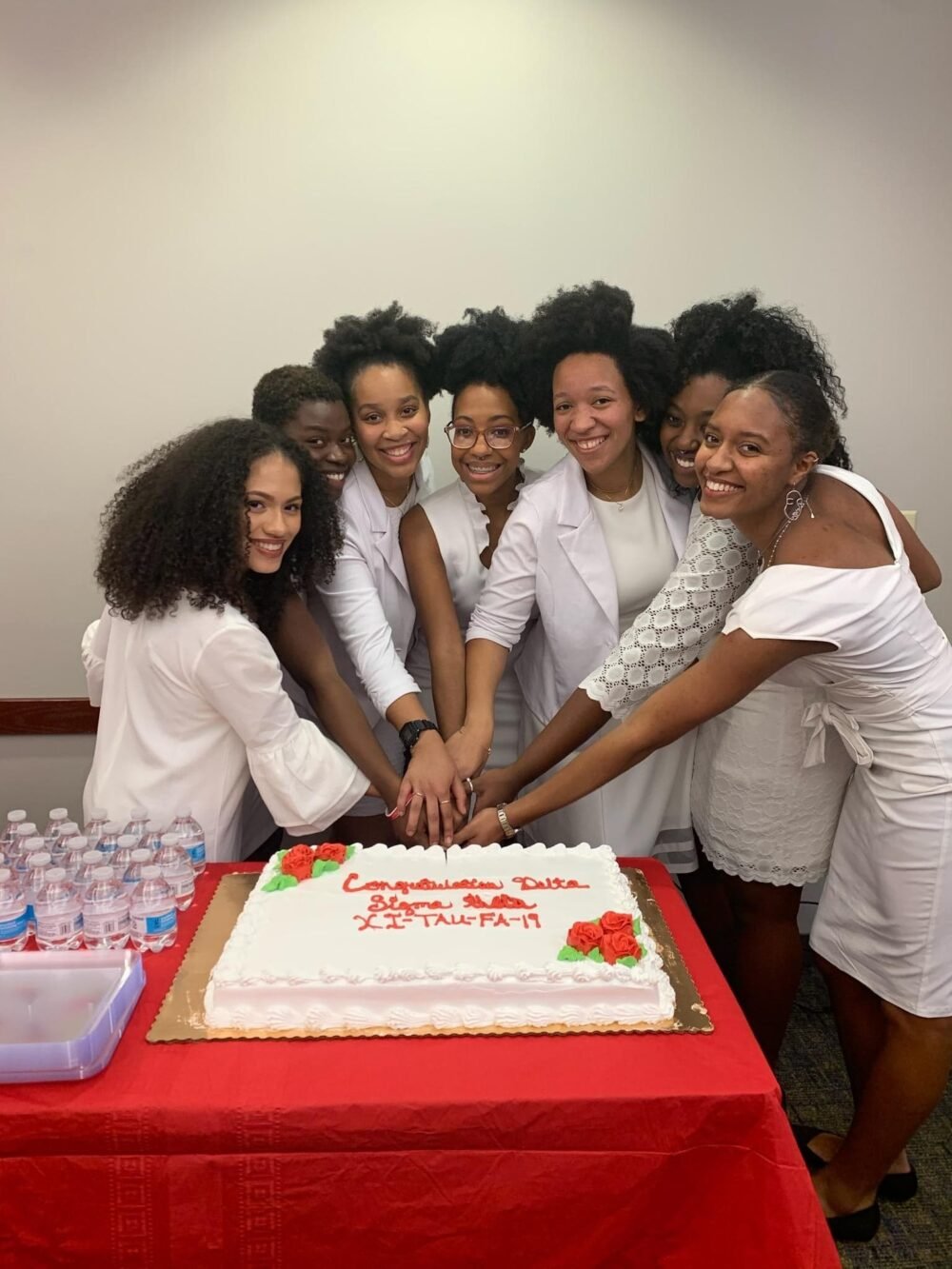
AudreyRose (third person from the right) and her line sisters (people in the same new members class) cutting a cake after their probate
Nikayah grew up with three major women supporters in her life: her mom and two aunts. They made sure that she was supported at all times and provided for her. Nevertheless, Nikayah grew up in a different environment compared to her family’s as they are all immigrants, and there were some limits in their support when it came to topics such as professional or educational development. So, she really valued long-lasting friendships with Black women who could guide and support her in these areas and more.
Benefits
When Nikayah graduated, she moved to Texas for her job where she didn’t know anybody. Here she joined her local alumni chapter and was immediately overwhelmed with a sense of togetherness and belonging. She says that she felt like she gained 20 moms when she joined the alumni chapter. She knows that she can rely on her sorors07 shorthand for sorority sisters if she ever needed help or guidance. During this pandemic, many sorority members’ family members passed away, and there was an outpour of love and support through sending messages in group chats, calling members, and sending cards. Nikayah even got a call from the chapter president which warmed her heart to have someone remember her during this turbulent time. It’s a special bond that she had never really experienced before.
Her network expands beyond her own sorority. When Nikayah told a friend, who happened to be an AKA, about her move to Dallas, this friend reached out to a Delta she knew in Dallas and connected her with Nikayah. She finds it beautiful that not only is her sorority well-connected and especially willing to help each other but so are D9 organizations as a whole. People are quick to introduce and connect with each other, so not only do you get to know one person but potentially have access to their network as well. In another instance, Nikayah was being screened for her chapter’s youth programs when her interviewer learned that Nikayah had just moved to Dallas for work and didn’t really know people at her company. Her interviewer called a soror she knew that worked at Nikayah’s company during the interview and introduced her right there and then. The following Monday, Nikayah sent her an email and was immediately put into the soror’s mentoring group. These two moments stand out to Nikayah as times when her sorority and D9 organizations helped her in ways she didn’t expect, and she’s immensely grateful.
As a traveler, the idea of connection deeply resonated with AudreyRose. Additionally, her church, the AME church, focuses on the fact that no matter where you go, there’s a church or a member of the church that will help you out and take you in. When she thinks of D9s, she’s reminded of these values of her church. Anecdotally, last summer her internship placed her on the West Coast for the first time in her life. Her entire family lives in the Northeast, so this was a new area for her. But friends she had made through different D9 organizations in Boston were able to either visit her and invite her to different cities on the coast or connect her to people who could. She appreciated that friends who weren’t even in her specific organization leveraged their network for her wellbeing and safety. AudreyRose has many stories like these, where she asked for help and people answered or found others could help instead.
Kenneth experienced the professional benefit of D9 organizations before he had even joined one. As he was initially getting to know different Kappa brothers, there was an alum that reached out to Kenneth and asked if he would be interested in a position working with GE. Kenneth sent his resume and other information needed and applied for the internship. He ended up receiving an offer.
Joining D9 organizations also provided many leadership opportunities. Nikayah served as the second Vice President for her chapter as soon as she pledged Delta. There are many ways to build leadership qualities both in collegiate and alumnae chapters through executive roles and committee membership. People trust that you will do a great job and put your best foot forward for the initiative. Kenneth not only held leadership in his chapter but also a position on the regional board, which he found fulfilling to serve his organization at this level. He gained a lot of skills and received a regional award for his commitment.
Finally, the social and educational events are fun and helpful. There are fun parties at the collegiate and even alumni chapters. Nikayah says she was surprised because she didn’t think adults would try to throw parties and she was shocked to find that she actually enjoyed them. There are also different social events such as paint nights, talent shows, karaoke nights, etc. and educational events or lectures on finances, healthcare, business, etc. Most of these events are open to the general public or college students.
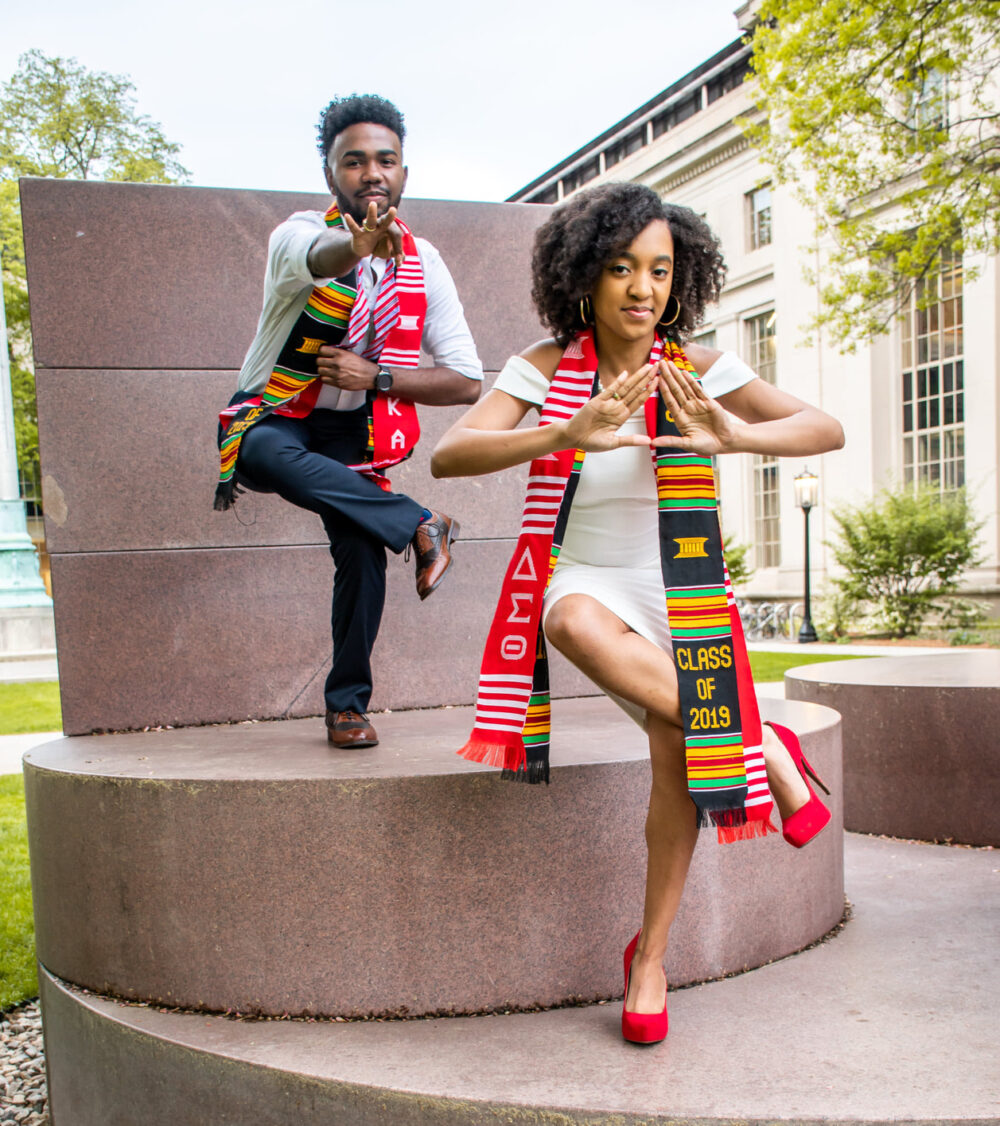
Kenneth and Nikayah repping their organizations’ letters and stances
Pros and Cons of City-wide chapter
An obvious disadvantage to having a city-wide chapter is the lack of housing options. It’s difficult to find a place where members from different schools can all live without having to travel for hours just to go to class. When it comes to hosting events, chapters don’t have a set place that they can use without paying and instead have to either rent or use existing college facilities. Though this is a financial cost, all three enjoy being in a city-wide chapter because they’ve made connections with people across multiple schools. The Boston Metropolitan area has over 100 colleges, but it’s really easy to let four years go by without visiting another college or university.
One of Nikayah’s line sisters08 </span>line sisters or brothers refer to the people in the same new members class goes to Babson, a school she had never been to until she had crossed09 This is the term used when a person joins a D9 organization. The person has 'crossed' over from a pledge to a member . She would never have gone to Babson if it weren’t for her line sister, and she’s grateful that she has been there now because it’s a fun and nice place. All three agree that it’s easy to get stuck in the MIT bubble because everything is on campus, but you don’t realize how refreshing it is to leave until you actually do. And it’s great to have people you can turn to hang out with or have a sleepover with.
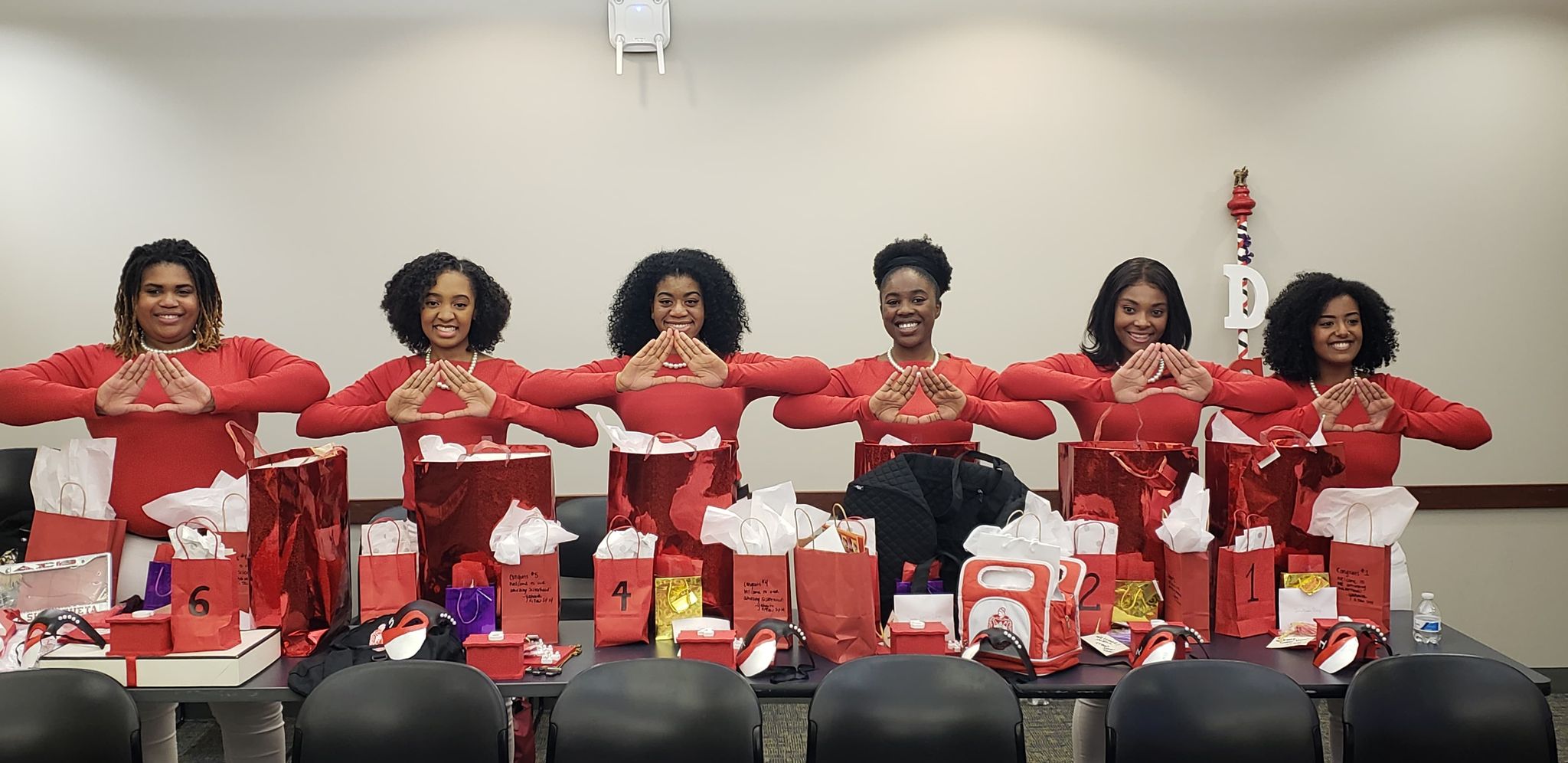
Nikayah (second person from the left) and her line sisters the night of their probate
Having multiple colleges under the same chapter can have other advantages with regard to access to resources. Some colleges provide money to the organization while others open up their facilities. The organization can host tailored events at different campuses and reach a wider audience. With this, however, comes the disadvantage of distance. Nikayah admits that the commute from MIT to Babson or Tufts can be long, and it can be especially difficult for people who live further out. People who live further out can feel excluded when members that live closer together can easily meet up. In order to be more accommodating, the chapter makes sure to plan events in advance and host them across different colleges, so that the burden of travel doesn’t fall on the same people and everyone can have equal access to programming.
Nikayah also enjoys the diversity in perspectives and studies. Members of her chapter are studying political science, education, biology, and so much more. One of AudreyRose’s line sisters goes to Wellesley and told her about a really cool class that AudreyRose could cross-register for and wouldn’t have heard about otherwise.
Impact and Growth
Joining a D9 organization provided the three with an atmosphere where they felt safe enough to develop into the person that they wanted to become. AudreyRose says that managing the distance made her really intentional about her relationships and time. She’s more aware of her time and makes sure that what, who, and where she dedicates her time fulfills her or her goals. She’d tried to implement this before, but having a support system that holds her accountable has propelled her to do so.
Kenneth and Nikayah have developed their passion and drive for service through their respective organizations. Service has become something Kenneth deeply associates with himself whether he’s doing it with his fraternity or in another place. Kenneth participates in programs mentoring young black men in Boston and has also mentored students at Cambridge Rindge and Latin. Having some type of impact on the community he comes from is a value that became increasingly important to him during his two years at his collegiate chapter. Now, the idea of paying it forward is ingrained in him. Nikayah has always wanted to help the community but didn’t know how to start. Joining these organizations provided a strong and clear foundation and strengthened her drive to serve.
On a personal level, Nikayah has been able to open up more since joining her sorority. She grew up with a culture that encouraged people to keep everything to themselves and power through things. Joining Greek life showed her that it’s okay to be honest and lean in for support during trying times and that it’s not a sign of weakness. She wasn’t used to openly talking and admitting her moments of struggle. She’s learned to allow people to hold her up as well as hold people up when they need it.
Friendships and Other Favorite aspects
They all agree that the friendships they’ve made and the people they’ve met are their favorite and even most powerful aspect of their D9 organizations. Some of the first people Nikayah has met while pursuing Delta have become her closest friends. Those friendships started as connections based on the shared interest in Delta and have now evolved to deeper friendships where she calls every two weeks just to catch up and check in. Nikayah and AudreyRose were friends before joining Delta, but since joining their friendship has blossomed even more, and they talk almost every day. These Greek organizations really emphasize togetherness and connection. This is important in times where people might not be getting along; everyone knows that they are still sisters, so the issue at hand will be fixed because everyone cares about each other anyways. Nikayah says this type of friendship is something she had never experienced before. In Nikayah’s alumni chapter, many of her sorors refer to her as their daughter, and she appreciates that the values of the organization have ingrained themselves into a lot of people and encouraged them to hold others close to their hearts.
Since graduating, Kenneth’s friendships with his chapter and brothers have evolved in that they are more intentional. Now that members are spread across the country, it’s even more important to actively reach out to people and check-in, and his chapter has had periodic zoom calls every two weeks or so. He says that it’s really refreshing to see everybody on the same call, and even with the distance, he feels more connected and closer to his brothers as he and other members take the initiative to reach out more. Nikayah echoes the same sentiment
AudreyRose adds that people from other D9 organizations are some of her closest friends. Even though they are not in the same organization, there is still the same shared experience that brings people together. There are so many different levels of relationships she has built; some people have become really good friends and others have become family.
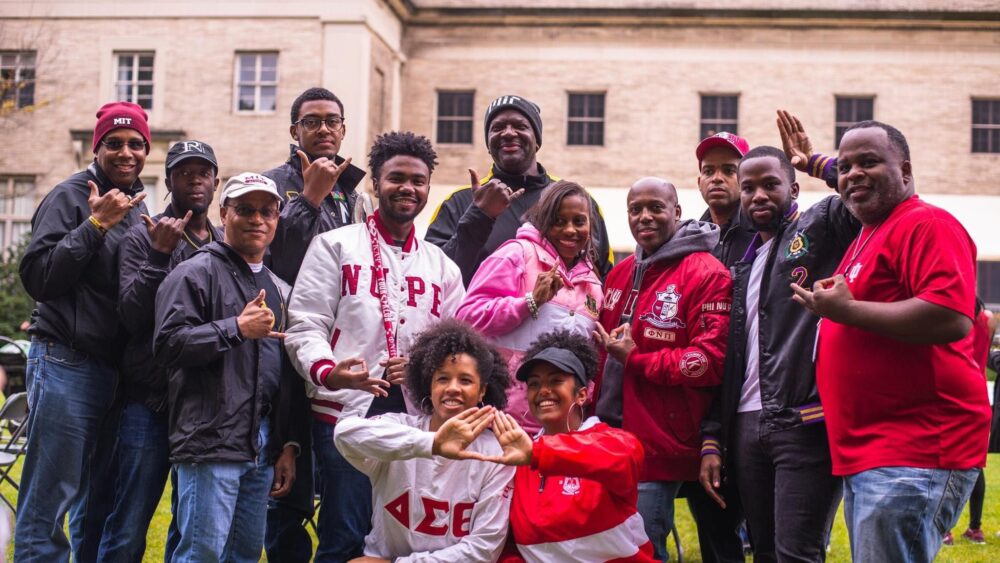
Current students and alumni at BSU’s first-ever Black Homecoming BBQ
Another aspect held dear to all of them are the many traditions of their organizations. While most of these traditions aren’t disclosed to the public, the few that are center on celebration. One of Kenneth’s favorite traditions of D9 Greek life in general are probate presentations. There are choreographed steps and routines, and a beautiful show detailing the organization’s history and mission is put on. Kenneth says these events feel like a family reunion because friends, family, older members of the chapter, and other chapters from around the country will come to see people being initiated. It’s a powerful moment for people to come together and bond over the addition of a few more people into the family. People support each other across chapters and organizations by proudly wearing their letters and attending these presentations.
Nikayah shares a story where one of her line sisters was moved by one Delta tradition. When a Delta member graduates, gets married, or goes through a similar major event, other sorors will serenade her with the sweetheart song, a song that pays tribute to their love and commitment to one another. Nikayah’s line sister saw this at a wedding, where the bride, also a Delta, was serenaded with this song. This moment touched her so much that it solidified her decision to become a Delta. AudreyRose also treasures this tradition because she cherishes these beautiful and powerful moments to celebrate people, organizations, achievements, and heritage both in private and in public.
Traditions like these and other private ones are special because it’s a way to connect everyone. Many of the traditions were established by either founding members or the earliest members of the organization, and participating in these traditions is like celebrating a legacy and connecting to older brothers or sisters that came before them. Kenneth admires how ceremonies can tie everyone in the room all back to this central place at a specific point in time in celebration and recognition of the struggles early members went through for current members to gather in a room today. AudreyRose emphasizes the importance of history especially because these traditions would not exist if these organizations did not have the long and rich history that they do. She says that if you don’t know where you’re coming from, you can’t have an idea of where you’re going. Going through traditions and ceremonies also reinforces the mission as an organization that were created specifically to serve Black communities.
Next Steps
There’s a common misconception that everything is exclusive and secretive, which intimidates people and discourages them from asking questions. Nikayah says that it’s not true at all. She encourages anyone who is interested to reach out to people from different organizations and ask them questions. Find people from the chapter’s website or other social media platforms and initiate conversations! The best way to learn about an organization is by asking members about their experiences. Ask about the culture, programs, values, morals, people, and more. The worst that someone can say is that they can’t share specific information. In addition, Nikayah encourages people not to be afraid to explore multiple organizations to determine which will be the best fit.
AudreyRose notes that even if you find an organization that you like, it’s paramount to actually reach out to the chapter near you or the one that you’d join and see if that is also a good fit. Ask questions and note the ways your questions are being answered because that might be telling of how the chapter operates. Pay attention to the interactions you have with people which should provide insight on what your experience would be like. Outside of reaching out, going to events hosted by different organizations is also really valuable. Moreover, it’s important to get to know members on a personal level. In the end, the people who know the chapter best are the members themselves, and members can help you determine if your values and goals are aligned with their chapter’s. Finally, if you don’t find a fit but love the organization, there are alumni chapters. What matters most is finding a place and support system that aligns with who you are and who you want to be.
- Black Greek apparel back to text ↑
- Rush is 'a chance for new freshmen guys to get a chance to meet as many fraternity members as possible and decide whether or not they’d like to live in a fraternity. It’s also a wonderful excuse to go paintballing, F1 racing, eat the obligatory steak and lobster, and throw golf balls attached to some string at a horizontal piece of PVC' This was taken straight from Snively's post titled The Other Side of Fraternities because I would not have described it any better. back to text ↑
- A probate is a new member presentation and is oftentimes a show of the organization's history, mission, steps, strolls, and more. back to text ↑
- IFC stands for Interfraternity Council and Panhel is the sorority version of IFC back to text ↑
- Bids are invitations to join a fraternity. back to text ↑
- Chapters for people who have graduated from college but want to remain active in the organization back to text ↑
- shorthand for sorority sisters back to text ↑
- line sisters or brothers refer to the people in the same new members class back to text ↑
- This is the term used when a person joins a D9 organization. The person has 'crossed' over from a pledge to a member back to text ↑